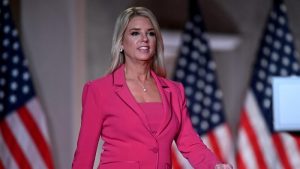An unpredictable America looks more and more like an emerging market
Unlock the US Election Countdown newsletter for free
The stories that matter on money and politics in the race for the White House
Last week, as the UN General Assembly met in New York, I moderated an event with a group of well-known economists and foreign affairs experts on the effects of the US election on the future of multilateralism.
Everyone agreed that Donald Trump would be a disaster for global co-operation, and that Kamala Harris was a bit of an unknown quantity. The most interesting takeaway, however, was that participants were less interested in how America would engage with the world than where the world would go with or without the US.
While it sometimes seems that policymakers and business leaders are breathlessly waiting, plans on hold, to see what happens in November, it’s perhaps truer to say that they are making peace with a world in which the US is not an anchor for stability, but rather a risk to be hedged against.
It is as if, over the past few years, America has become one giant emerging market — full of peril and promise but most of all unpredictability. Political leaders overseas know policies may change radically every four years. CEOs understand that the subsidies and tax breaks offered today may disappear tomorrow. Investors are considering the premium that should go along with rising debt and more volatile politics.
Indeed, many governments and businesses are, as Pi Capital put it in a recent briefing, “quietly trying to decouple themselves from reliance on the US”. That includes everything from increased military spending on the part of Japan and Europe, to German corporations such as SAP, the supermarket chain Lidl, the Bayern Munich football club and the Port of Hamburg shifting away from American technology platforms because they don’t want sensitive information running through either US or Chinese servers. As a Bayern Munich spokesperson put it to the Financial Times in August, the shift to Schwarz Digits, a German cloud system, was a matter of “digital sovereignty”.
There’s still plenty of money from Europe pouring into the US, in part because of worries about China, but there’s also increasing concern about America as a risk node. Last week, I spoke to someone in government affairs at a large US technology company who told me that she was hearing from many European clients who worried that “America was becoming less reliable” as a partner.
Some of this was down to uncertain politics and the policy implications, which increasingly include tariffs, export controls and sanctions. Some of it is about the fiscal stimulus that favours US players. But the key problem was really a lack of clear, stable guidelines and demand signals that businesses can count on for the long haul. Would a re-elected Donald Trump dismantle the 2022 Inflation Reduction Act? Would Kamala Harris take the same approach as the Biden administration to Big Tech?
Mark Rosenberg, the founder and co-head of the research firm GeoQuant, notes that this “EM-ification” of the US goes beyond uncertain presidential politics. It’s also about “institutions [that have] become too weak to clearly define or enforce political rules and norms, increasing social polarisation, political violence and economic uncertainty around key political events”, which would include not only elections but things like the endless debt ceiling wrangles.
I’d add to that list the way in which violence — not just the political kind but the mass public shootings that happen roughly every two days in the US — has become normalised. You can now purchase bulletproof backpacks in America for a generation of children that have grown up practising lockdowns in their primary schools. I was amazed two years ago when my own son missed a subway shooting in Brooklyn by just one stop, and called me not in terrified tears, but to calmly ask whether he could order Uber Eats for lunch since his school was locked down. When children view violence in their daily lives as normal, something is desperately wrong.
The EM-ification of US politics has been a consistent finding in GeoQuant data since 2016. While the overall level of political risk in the US remains below most EMs, the rate of change in risk — especially underlying political violence, social polarisation and institutional risks — have increased at a similar rate to historically volatile EMs like Russia, Turkey, Bolivia, South Africa, Lebanon and Hungary. This was true through both the Trump and the Biden administrations.
And it’s not America alone here. The average developed country risk is increasing more rapidly than the average emerging market risk, thanks to irregular leadership turnovers, greater policy swings and the economic and financial volatility that comes with it all. We are all emerging markets now, it seems.
The big question for investors, one that many have been asking for years now, is when all this will reduce the haven status of the dollar, or weaken US equity markets, which remain against all odds the world’s most liquid home for capital, both foreign and domestic. The dollar may be sliding a bit these days, but US stock markets are still roaring.
That said, GeoQuant data shows that political risk is a factor in 10- and 30-year bond yields. It’s kept the VIX, a measure of expected stock market volatility, high, and it has pushed daily Treasury yields higher. It’s also a reason that gold is at record prices. Just as policymakers and business people are hedging their bets, so too are investors who see risk, not just reward, in the US.
#unpredictable #America #emerging #market





